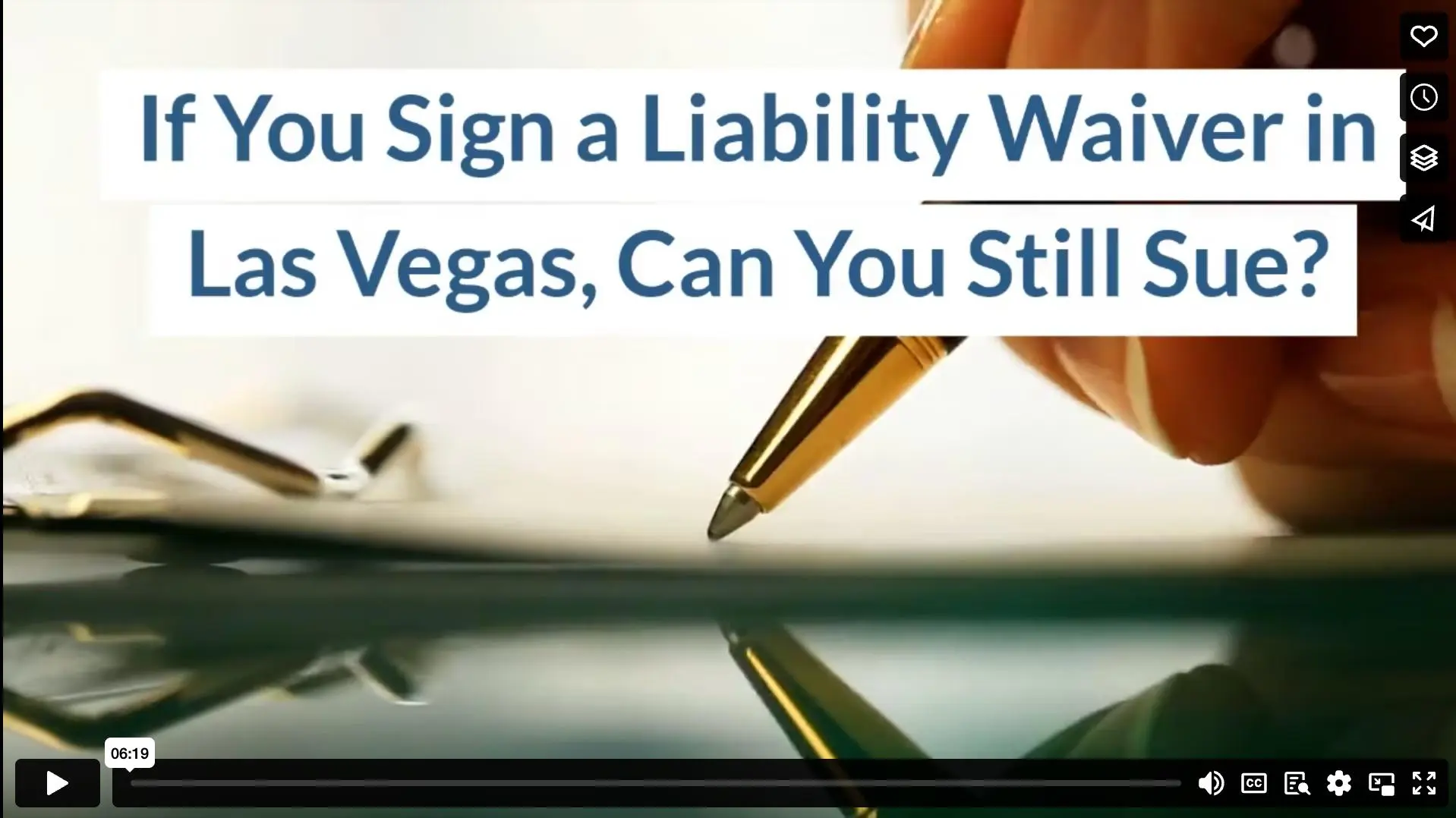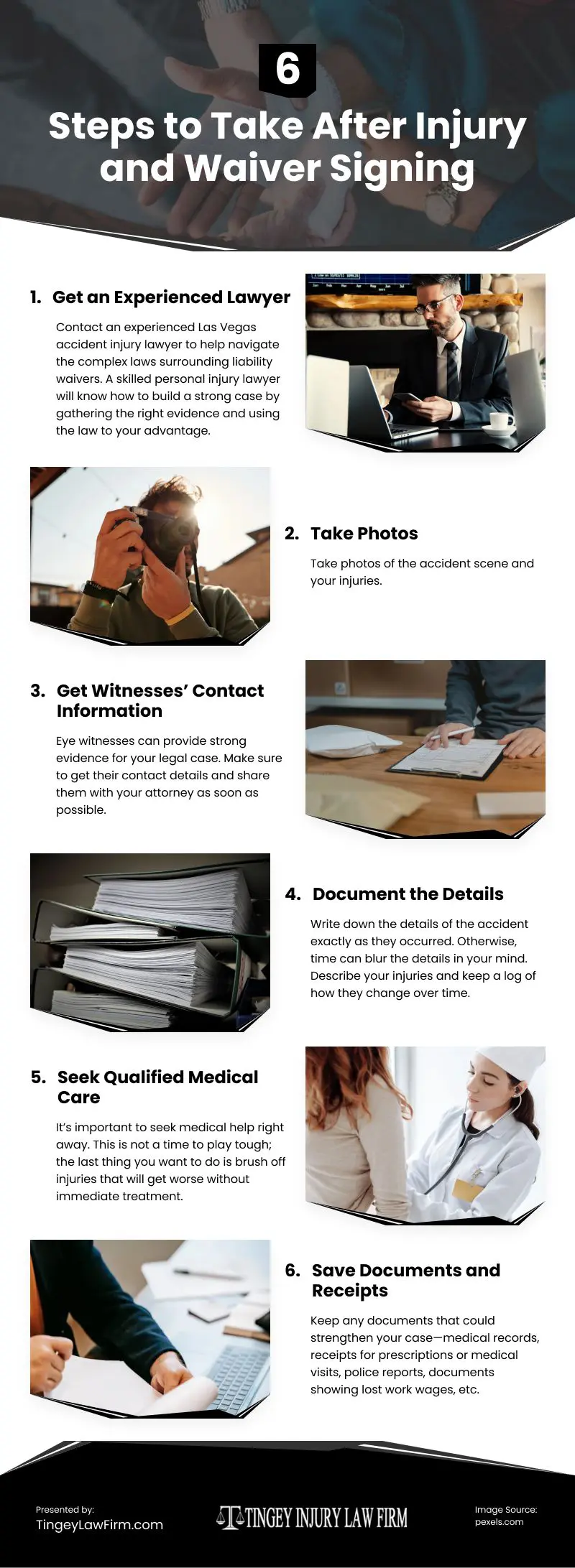You may have heard of the haunting beauty of Red Rock Canyon about 30 minutes east of Las Vegas. You want to see the striking red hues of the sandstone formations, the ancient petroglyphs, and the Joshua trees for yourself.
You decide to rent electric bikes as a family and take in the views. Unfortunately, your brakes aren’t working well, and you lose control on a downhill slope. You end up with an incredibly painful broken elbow. Because of the location of the break, your doctor says it may take a long time to heal. You worry about regaining your usual range of motion. You wonder how this will affect your work and your income.
You let the rental company know that their bike was poorly maintained, contributing to your accident. They remind you that you signed a waiver and say there is nothing they can do to help you.
What now?

(freepik/Freepik)
What’s the Purpose of a Liability Waiver?
A liability waiver (sometimes called a release of liability) is a legally binding agreement between two parties: the releasor and the releasee.
When you (the releasor) agree to sign the waiver, you release the other party (the releasee) from responsibility for damages or injuries. In the scenario above, the biker is the releasor. The biking company is the releasee.
Who Requires Signed Liability Waivers?
Anyone offering risky activities may require participants to sign a liability waiver. You may be asked to sign a liability waiver for:
- Trampoline parks
- Amusement parks
- Gym or recreation centers
- Laser tag
- Sky diving
- Bungee jumping
- Team sports (such as youth soccer or football leagues)
- Shooting ranges
- Venue rentals
- Sports or entertainment events
- Vehicle rentals (go-karts, electric scooters, bikes, electric bikes, etc.)
- Equipment rental (skis, ice skates, roller skates, etc.)
- …and more
You cannot be forced to sign a liability waiver, but you may be barred from participating in an activity or using certain equipment if you do not sign a waiver.
Can I Sue if I Signed a Liability Waiver?
Some people believe (or are led to believe) that if they signed a liability waiver, they have waived all rights to sue. But this may not be true. You may still be able to hold the releasee responsible if:
- The waiver did not properly inform the releasor of potential risks
- The waiver was not clearly written
- The releasee caused intentional harm
- The releasee was guilty of gross negligence (a degree of carelessness that disregards the health and safety of others)
In the electric bike example above, if the rental company did not properly maintain their e-bikes, it might be considered gross negligence.
Other examples of gross negligence could include:
- A laser tag facility leaving debris on the floor, causing people to trip over it in the dark
- A gym failing to maintain its equipment, putting patrons at risk for injury
- A skiing instructor taking students on runs that exceed their abilities
- A whitewater rafting guide taking patrons into excessively dangerous conditions
What if I Was Partially at Fault for an Accident Involving a Liability Waiver?
Let’s say that you did not stay on the designated trails (as specified by the rental company) when your electric bike accident occurred. On the one hand, you were breaching the terms of the agreement. On the other hand, the bike rental company was negligent in not maintaining the equipment.
Nevada law operates according to a concept called “modified comparative negligence.” This means that even if you bear some fault for the accident, you can still get some compensation as long as you are not found to be more at fault than the opposing party. If the court determines that the fault is 50/50, you can still get compensation. If the court determines that you bear 51% of the fault, you cannot get compensation.
What if a Third Party Is at Fault?
In some cases, neither the releasee nor the releasor bears fault for the accident. For example, let’s say that your bike accident wasn’t the result of the rental company failing to maintain your bike but rather the fault of the bike manufacturer installing the brakes poorly in the first place. In this instance, your legal case may be against the bike maker.
Or maybe there was poor signage on the trail that caused you not to see a hazard or unexpected turn or dip in the trail. In this case, it might be appropriate to sue the park rather than the bike rental company.
What Do I Do if I’m Harmed After Signing a Liability Waiver in the Greater Las Vegas Area?
Get an Experienced Lawyer
Start by contacting an experienced Las Vegas accident injury lawyer near you. The laws surrounding liability waivers can be tricky to navigate, especially when there is a fine line between which party is at fault. You will want a personal injury lawyer who knows how to use the law in your favor and will gather the right evidence to build an ironclad case.
They can also be the go-between for dealing with the opposing party’s insurance company. Some insurance companies will try to trap you into saying things that could hurt your case. Your attorney can do the talking, saving you from playing into the insurance company’s tactics.
Take Photos
Take photos of the accident scene and your injuries.
Get Witnesses’ Contact Information
Eye witnesses can provide strong evidence for your legal case. Make sure to get their contact details and share them with your attorney as soon as possible.
Document the Details
Write down the details of the accident exactly as they occurred. Otherwise, time can blur the details in your mind. Describe your injuries and keep a log of how they change over time. You can also write down how your injuries are affecting you at work and on the homefront.
Seek Qualified Medical Care
Your attorney can help direct you to the best medical specialists. It’s important to seek medical help right away. This is not a time to play tough; the last thing you want to do is brush off injuries that will get worse without immediate treatment. Also, an initial evaluation from a physician can help show that your injuries are from your accident, not from a pre-existing condition. (Insurance companies often try to tie your injuries to previous accidents or health problems.)
Make sure to go to all of your medical appointments and do the things that the medical specialist (doctor, physical therapist, etc.) tells you to do. If you don’t, it could look like you aren’t serious about getting better or that your injuries aren’t as bad as you say they are.
Save Documents and Receipts
Keep any documents that could strengthen your case—medical records, receipts for prescriptions or medical visits, police reports, documents showing lost work wages, etc.
Don’t assume that just because you signed a liability waiver, you don’t have a legal case. Talk to an accident injury attorney for a case evaluation.
Video
Infographic
Signing a liability waiver doesn’t mean you can’t pursue a legal case. Consult an accident injury attorney for a case evaluation. Learn from this infographic what steps to take if harmed after signing a waiver.


